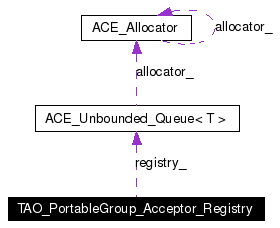
#include <PortableGroup_Acceptor_Registry.h>
Collaboration diagram for TAO_PortableGroup_Acceptor_Registry:

Public Types | |
| typedef ACE_Unbounded_Queue< Entry > | Acceptor_Registry |
| typedef ACE_Unbounded_Queue_Iterator< Entry > | Acceptor_Registry_Iterator |
Public Member Functions | |
| TAO_PortableGroup_Acceptor_Registry (void) | |
| Default constructor. | |
| ~TAO_PortableGroup_Acceptor_Registry (void) | |
| Default destructor. | |
| void | open (const TAO_Profile *profile, TAO_ORB_Core &orb_core) |
| Open an acceptor based on a tagged profile. | |
| int | close_all (void) |
| Close all open acceptors. | |
Protected Member Functions | |
| void | open_i (const TAO_Profile *profile, TAO_ORB_Core &orb_core, TAO_ProtocolFactorySetItor &factory) |
| Helper function to open a group acceptor. | |
| int | find (const TAO_Profile *profile, Entry *&entry) |
| Find an acceptor by using a profile. | |
Private Member Functions | |
| TAO_PortableGroup_Acceptor_Registry (const TAO_PortableGroup_Acceptor_Registry &) | |
| void | operator= (const TAO_PortableGroup_Acceptor_Registry &) |
Private Attributes | |
| Acceptor_Registry | registry_ |
| List of acceptors that are currently open. | |
There is one TAO_PortableGroup_Acceptor_Registry per ORB_Core.
Definition at line 49 of file PortableGroup_Acceptor_Registry.h.
|
|
Definition at line 86 of file PortableGroup_Acceptor_Registry.h. |
|
|
Definition at line 87 of file PortableGroup_Acceptor_Registry.h. Referenced by find(), and ~TAO_PortableGroup_Acceptor_Registry(). |
|
|
Default constructor.
Definition at line 19 of file PortableGroup_Acceptor_Registry.cpp.
00020 {
00021 }
|
|
|
Default destructor.
Definition at line 23 of file PortableGroup_Acceptor_Registry.cpp. References TAO_PortableGroup_Acceptor_Registry::Entry::acceptor, Acceptor_Registry_Iterator, ACE_Unbounded_Queue_Iterator< Entry >::advance(), TAO_PortableGroup_Acceptor_Registry::Entry::endpoint, and ACE_Unbounded_Queue_Iterator< Entry >::next().
00024 {
00025 // Free the memory for the endpoints.
00026 Entry *entry;
00027 Acceptor_Registry_Iterator iter (this->registry_);
00028
00029 while (iter.next (entry))
00030 {
00031 delete entry->endpoint;
00032 delete entry->acceptor;
00033 iter.advance ();
00034 }
00035 }
|
|
|
|
|
|
Close all open acceptors.
|
|
||||||||||||
|
Find an acceptor by using a profile.
Definition at line 171 of file PortableGroup_Acceptor_Registry.cpp. References Acceptor_Registry_Iterator, ACE_Unbounded_Queue_Iterator< Entry >::advance(), TAO_Profile::endpoint(), TAO_PortableGroup_Acceptor_Registry::Entry::endpoint, TAO_Endpoint::is_equivalent(), and ACE_Unbounded_Queue_Iterator< Entry >::next(). Referenced by open().
00173 {
00174 Acceptor_Registry_Iterator iter (this->registry_);
00175
00176 while (iter.next (entry))
00177 {
00178 // Since the endpoint routine is nonconst, need to
00179 // cast away the constness even though we're not
00180 // changing anything.
00181 TAO_Profile *nc_profile = const_cast<TAO_Profile *> (profile);
00182 if (entry->endpoint->is_equivalent (nc_profile->endpoint ()))
00183 return 1;
00184
00185 iter.advance ();
00186 }
00187
00188 return 0;
00189 }
|
|
||||||||||||
|
Open an acceptor based on a tagged profile.
Definition at line 39 of file PortableGroup_Acceptor_Registry.cpp. References ACE_CHECK, ACE_ENV_ARG_PARAMETER, TAO_PortableGroup_Acceptor_Registry::Entry::cnt, find(), open_i(), TAO_Profile::tag(), and TAO_ProtocolFactorySetItor. Referenced by TAO_GOA::create_group_acceptors().
00042 {
00043 Entry *entry;
00044
00045 if (this->find (profile, entry) == 1)
00046 {
00047 // Found it. Increment the reference count.
00048 ++entry->cnt;
00049 }
00050 else
00051 {
00052 // Not found. Open a new acceptor.
00053
00054 // Now get the list of available protocol factories.
00055 TAO_ProtocolFactorySetItor end =
00056 orb_core.protocol_factories ()->end ();
00057
00058 // int found = 0;
00059 // If usable protocol (factory) is found then this will be
00060 // set equal to 1.
00061
00062 for (TAO_ProtocolFactorySetItor factory =
00063 orb_core.protocol_factories ()->begin ();
00064 factory != end;
00065 ++factory)
00066 {
00067 if ((*factory)->factory ()->tag () == profile->tag ())
00068 {
00069 this->open_i (profile,
00070 orb_core,
00071 factory
00072 ACE_ENV_ARG_PARAMETER);
00073 ACE_CHECK;
00074
00075 // found = 1; // A usable protocol was found.
00076 }
00077 else
00078 continue;
00079 }
00080 }
00081 }
|
|
||||||||||||||||
|
Helper function to open a group acceptor.
Definition at line 86 of file PortableGroup_Acceptor_Registry.cpp. References TAO_PortableGroup_Acceptor_Registry::Entry::acceptor, ACE_ERROR, ACE_TEXT(), ACE_THROW, TAO_Endpoint::addr_to_string(), TAO_PortableGroup_Acceptor_Registry::Entry::cnt, TAO_Endpoint::duplicate(), TAO_PortableGroup_Acceptor_Registry::Entry::endpoint, TAO_Profile::endpoint(), ACE_Unbounded_Queue< T >::enqueue_tail(), TAO_ORB_Core::lane_resources(), TAO_Thread_Lane_Resources::leader_follower(), LM_ERROR, TAO_GIOP_Message_Version::major, MAX_ADDR_LENGTH, TAO_GIOP_Message_Version::minor, TAO_Acceptor::open(), TAO_Leader_Follower::reactor(), TAO_ACCEPTOR_REGISTRY_OPEN_LOCATION_CODE, TAO_debug_level, and TAO_Profile::version(). Referenced by open().
00090 {
00091 TAO_Acceptor *acceptor = (*factory)->factory ()->make_acceptor ();
00092
00093 if (acceptor != 0)
00094 {
00095 // Extract the desired endpoint/protocol version if one
00096 // exists.
00097 const TAO_GIOP_Message_Version &version = profile->version ();
00098 char buffer [MAX_ADDR_LENGTH];
00099
00100 // Removed the constness of profile. We're not changing
00101 // anything, but need to call a nonconst function.
00102 TAO_Profile* nc_profile = const_cast<TAO_Profile *> (profile);
00103 nc_profile->endpoint ()->addr_to_string (buffer, MAX_ADDR_LENGTH);
00104
00105 if (acceptor->open (&orb_core,
00106 orb_core.lane_resources ().leader_follower ().reactor(),
00107 version.major,
00108 version.minor,
00109 buffer,
00110 0) == -1)
00111 {
00112 delete acceptor;
00113
00114 if (TAO_debug_level > 0)
00115 ACE_ERROR ((LM_ERROR,
00116 ACE_TEXT ("TAO (%P|%t) ")
00117 ACE_TEXT ("unable to open acceptor ")
00118 ACE_TEXT ("for <%s>%p\n"),
00119 buffer,
00120 ""));
00121
00122 ACE_THROW (CORBA::BAD_PARAM (
00123 CORBA::SystemException::_tao_minor_code (
00124 TAO_ACCEPTOR_REGISTRY_OPEN_LOCATION_CODE,
00125 EINVAL),
00126 CORBA::COMPLETED_NO));
00127 }
00128
00129 // Add acceptor to list.
00130 Entry tmp_entry;
00131 tmp_entry.acceptor = acceptor;
00132 tmp_entry.endpoint = nc_profile->endpoint ()->duplicate ();
00133 tmp_entry.cnt = 1;
00134
00135 if (this->registry_.enqueue_tail (tmp_entry) == -1)
00136 {
00137 delete acceptor;
00138
00139 if (TAO_debug_level > 0)
00140 ACE_ERROR ((LM_ERROR,
00141 ACE_TEXT ("TAO (%P|%t) ")
00142 ACE_TEXT ("unable to add acceptor to registry")
00143 ACE_TEXT ("for <%s>%p\n"),
00144 buffer,
00145 ""));
00146
00147 ACE_THROW (CORBA::BAD_PARAM (
00148 CORBA::SystemException::_tao_minor_code (
00149 TAO_ACCEPTOR_REGISTRY_OPEN_LOCATION_CODE,
00150 EINVAL),
00151 CORBA::COMPLETED_NO));
00152 }
00153 }
00154 else
00155 {
00156 if (TAO_debug_level > 0)
00157 ACE_ERROR ((LM_ERROR,
00158 ACE_TEXT ("TAO (%P|%t) ")
00159 ACE_TEXT ("unable to create acceptor ")
00160 ));
00161
00162 ACE_THROW (CORBA::BAD_PARAM (
00163 CORBA::SystemException::_tao_minor_code (
00164 TAO_ACCEPTOR_REGISTRY_OPEN_LOCATION_CODE,
00165 EINVAL),
00166 CORBA::COMPLETED_NO));
00167 }
00168 }
|
|
|
|
|
|
List of acceptors that are currently open.
Definition at line 110 of file PortableGroup_Acceptor_Registry.h. |
 1.3.6
1.3.6